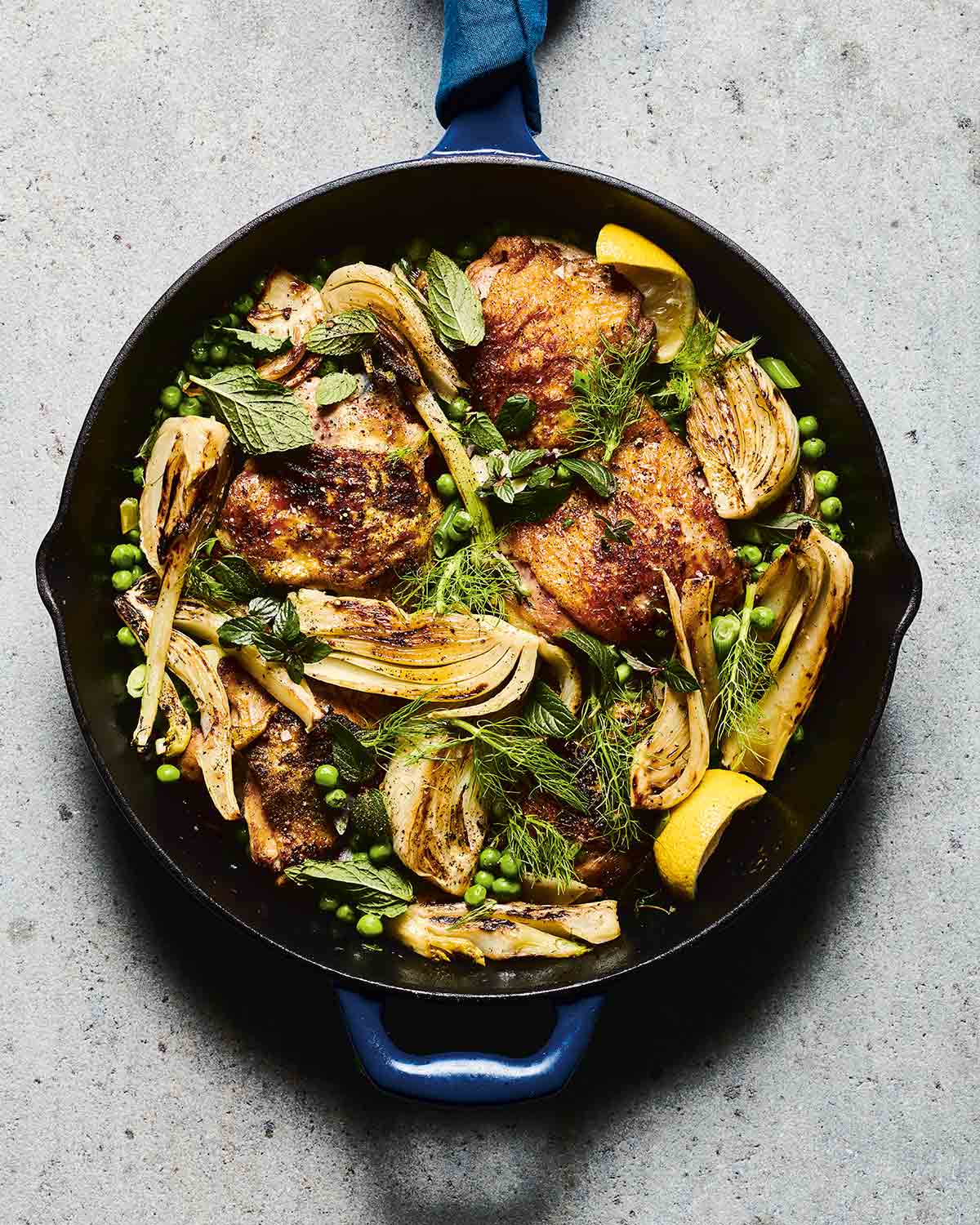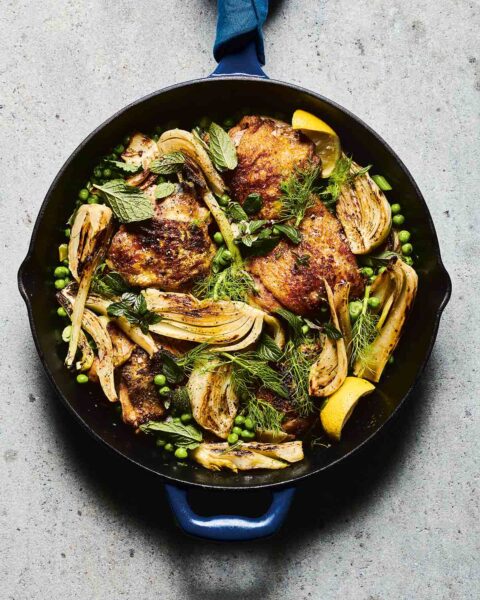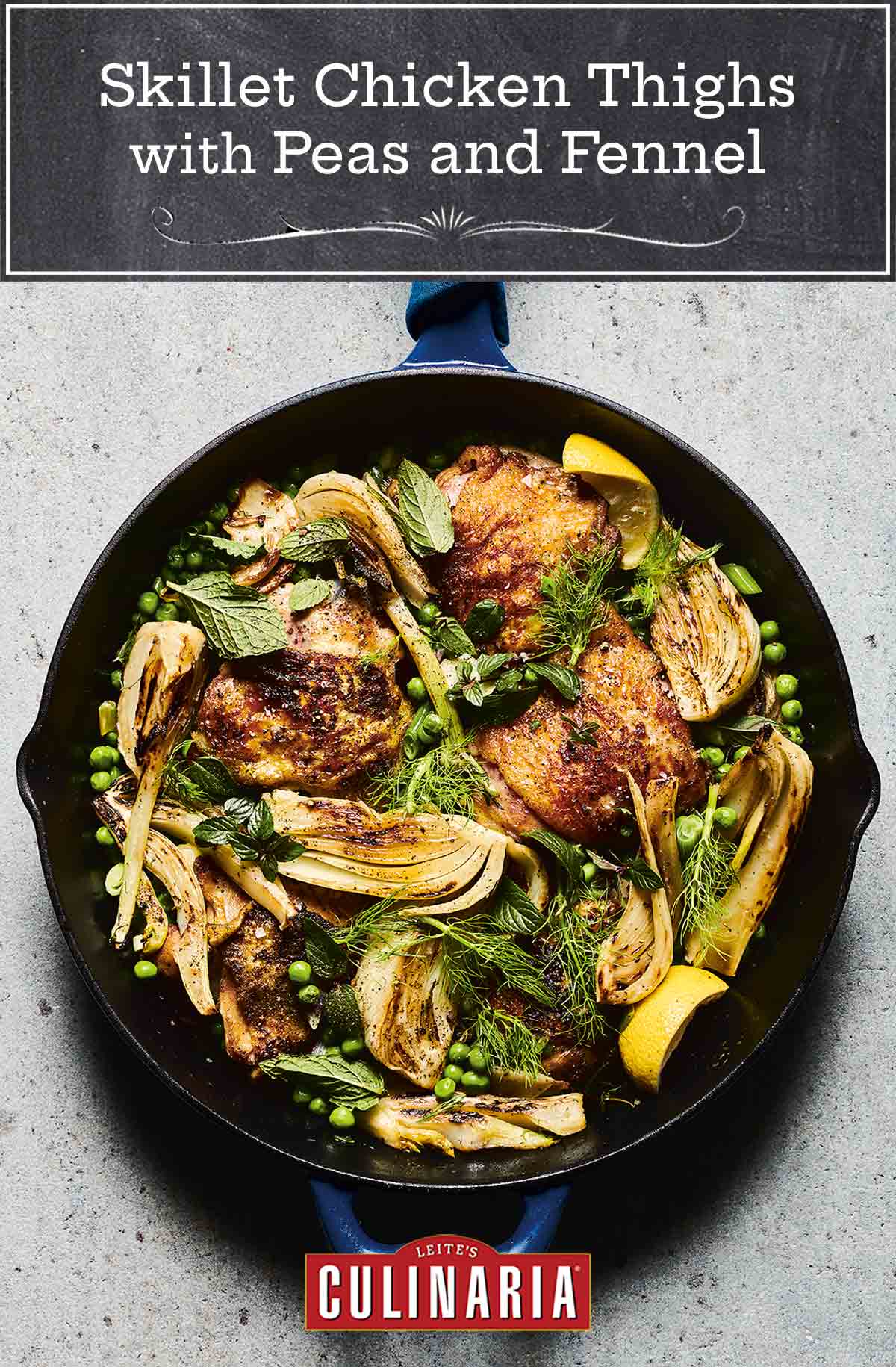
If you’ve ever wondered how to make juicy, tender chicken thighs with shatteringly crisp skin, well, this is your lucky day. This recipe deploys a technique called the “cold-pan method,” which was first introduced to me by Chris Morocco. Things have not been the same for me since. When you start chicken thighs skin-side down in a cold pan (that’s right—cold!) and allow the skin to very gradually cook, it releases all of their moisture and fat, landing you smack-dab in CrispyTown, USA.—Molly Baz

Skillet Chicken Thighs with Peas and Fennel FAQs
Yes. You want to make sure you use pieces of a similar size so that they cook evenly. Chicken breasts will take longer to cook, and drumsticks will require more turning to achieve crispy, browned skin all over the drumstick.
This recipe uses the “cold-pan method” that begins with cooking the chicken skin-side down in a cold skillet. As the skillet heats, the skin begins to render fat and moisture, which allows the skin to become crispy and release from the skillet.
The most important thing to remember is to have patience. When the chicken is ready to release, it will. Give it a little nudge. If it’s still sticking to the pan, give it another minute or two until the chicken naturally releases.

Skillet Chicken Thighs with Peas and Fennel
Ingredients
- 1 large (12 oz) fennel bulb
- 2 1/2 pounds (about 6) bone-in, skin-on chicken thighs
- Kosher salt and coarsely ground black pepper
- 6 scallions, thinly sliced
- 3 garlic cloves, thinly sliced
- 3 tablespoons (1 1/2 oz) unsalted butter
- One (10-ounce) bag frozen or fresh English peas
- 1/2 teaspoon crushed red pepper flakes
- 1/4 cup water
- 2 lemons, preferably organic
- 1 cup fresh mint, dill, and/or basil leaves
Instructions
- Position a rack in the bottom third of the oven. Preheat the oven to 425°F (220°C).
- Trim off the tough root end and any stalks or fronds from the fennel bulb. Cut in half lengthwise and slice into 1/2-inch thick (12-mm) wedges.
☞ TESTER TIP: Reserve the fronds and swap them in for some of the herbs at the end.
- Pat the chicken thighs dry with paper towels to remove any surface moisture. Season the chicken all over with 2 1/2 teaspoons salt and a few good cranks of coarsely ground black pepper.
- Arrange the thighs skin-side down in a dry, unheated 12-inch (30-cm) cast-iron skillet. Set over medium heat and cook, undisturbed, until the skin releases easily from the pan and is light golden brown, 10 to 12 minutes.
- Once released, move the chicken thighs around a bit to ensure even browning. Parts of your skillet will get hotter than others. Continue to cook until the skin is very crisp and deep golden brown, 4 to 6 minutes more, reducing the heat if necessary to avoid burning. Use tongs to transfer the thighs to a plate, skin-side up.
- Use the tongs to add the fennel wedges to the skillet, turning them to coat in some of the rendered chicken fat. Season with 1/2 teaspoon salt.
- Return the chicken to the skillet, skin-side up. Transfer the skillet to the oven and roast, flipping the fennel halfway through for even browning, until the chicken meat is no longer pink, and has reached an internal temperature of 165°F (74°C) and the fennel is caramelized, 10 to 12 minutes.
- Remove the skillet from the oven and transfer the thighs to a plate, skin-side up to stay nice and crisp.
- Add the scallions, garlic, and butter to the fennel in the skillet. Cook over medium heat until the scallions and garlic have softened but not browned, 1 to 2 minutes.
- Stir in the peas, crushed red pepper flakes, water, and 1/2 teaspoon salt, scraping up any browned bits from the bottom of the skillet (that’s flavor!), and cook until the peas are bright green and just cooked through, 3 to 4 minutes. Turn off the heat.
☞ TESTER TIP: If using frozen peas, you may need a few extra minutes to get your peas cooked through.
- Stir in the juice of 1/2 lemon. Taste the peas and add more salt or lemon juice as needed.
- To serve, cut whatever lemon remains into wedges. Divvy the peas and fennel among 4 shallow bowls and top each with a chicken thigh or two, a lemon wedge, and some torn fresh mint, dill, or basil.

Explore More with AI
Nutrition
Nutrition information is automatically calculated, so should only be used as an approximation.
Recipe Testers’ Reviews
The other night, after dinner, while my husband washed dishes, you would have found me standing over the stove, shoveling the remaining peas and fennel directly into my mouth from the pan. The schmaltzy sauce combined with the sweetness of the peas and fennel, the lemon’s acidity, and the mint’s brightness was something special.
Earlier at the table with a perfectly cooked, crispy chicken thigh, it made for a perfect weeknight dinner. I found this recipe easy to follow and largely accurate. Perhaps the medium on my stove runs hot, but I did find the time to brown the skin took about half the time the recipe suggests. A meal in itself, I did serve it with a green salad.
Look no further for a complete one-dish meal that exceeds its super crispy promise. The chicken thighs’ skin is exceedingly crispy and the meat is super tender.
Having strictly followed the cold-pan instructions and loved the effortless results, I am now a “cold-pan method” convert. No added oil. No preheated pan. No fuss! Just place the uncooked thighs in a cold pan, turn up the heat and leave them for 12 minutes. I love the simplicity of the process.
Not to be ignored are the gorgeous vegetables. The caramelized fennel, sweet green peas, and chopped scallions add a nice allium flavor, while also providing even more green color. Overall, it’s a stunning dish to behold.
I have mixed feelings about these skillet chicken thighs with peas and fennel. On the one hand, the flavors of the garlic, fennel, and basil were quite inviting, and the chicken was moist and tender. On the other hand, the chicken skin did NOT crisp as advertised. I think there was too much liquid in the pan for the fennel to caramelize properly. This WAS my first time using fennel bulb; given the directions in the recipe, the fennel slices did cook thru, and were a pleasant flavor and texture in the dish. Have to question the amount of salt in the dish, though.











